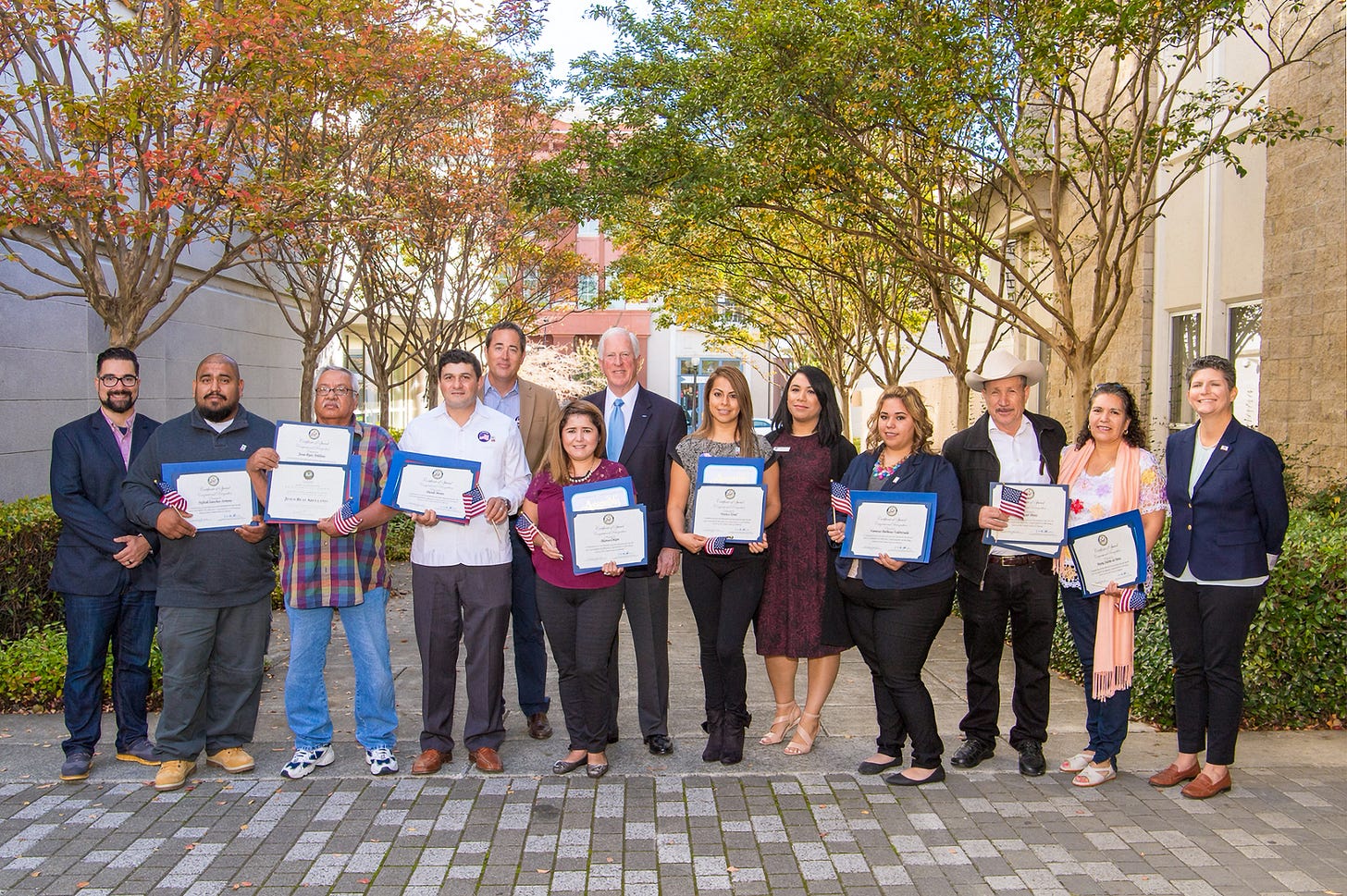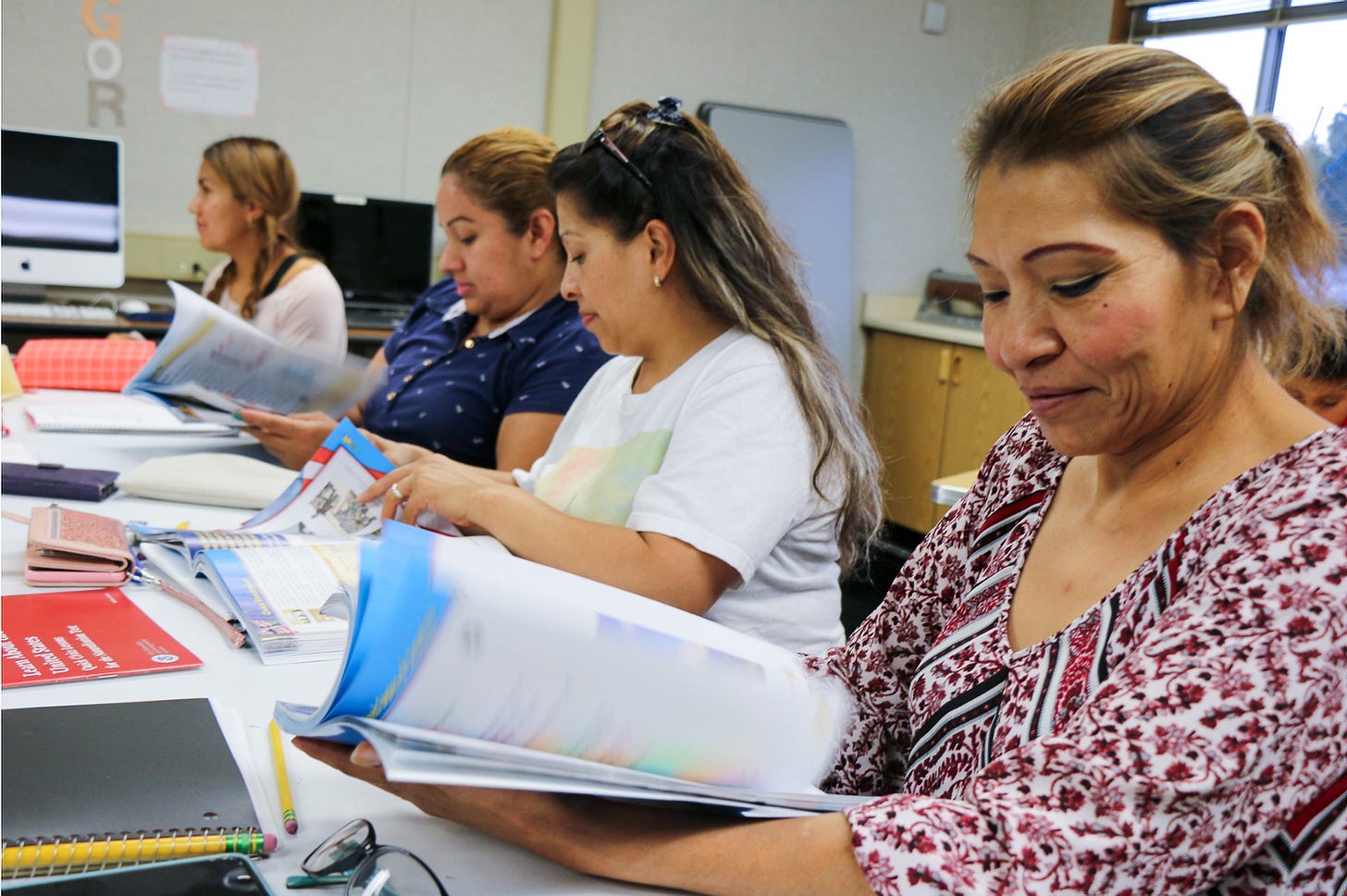NAPA VALLEY, Calif. — The Napa Valley Community Foundation recently put out a call to help legal immigrant-residents apply for U.S. citizenship. Bringing these contributing members of our community into the fold will enrich the entire valley.
Citizenship is not easy to attain. One must first become a legal permanent resident, then wait five years before being allowed to apply for citizenship through a process called naturalization. (Spouses of U.S. citizens must wait only three years before applying). The applicant must meet numerous requirements that include having good moral character, the ability to speak English, a knowledge of history and government, a history of paying taxes and child support, and no current probation for any criminal matter.
Legal advice and representation are of critical importance in this process. Immigrants are notoriously underrepresented, and the Transactional Records Access Clearinghouse at Syracuse University has found that they have several issues gaining access to legal services.
When I moved to Napa in late 2016 I was about to retire from a 40-year career in immigration law, roughly half the time as an attorney in Silicon Valley and half as an immigration judge in San Francisco. Napa County’s public defender asked me if I would help the office analyze plea deals offered by the district attorney to determine whether a conviction would expose their clients to removal, in keeping with requirements set forth by the U.S. Supreme Court in Padilla v. Kentucky and also by the California attorney general through corresponding legislation (CPC §§1016.2, 1015.3, 1016.5) that codifies the Supreme Court decision.
Shortly thereafter Terence Mulligan, president of the community foundation, told me what they were doing to try to incorporate the migrant community into Napa’s mainstream.
It was evident that responsible community organizations within the valley were aware of the needs of the immigrant community and the benefit to us all from giving those who qualify a meaningful reward for their hard work — the right to have a say in their government.
The foundation was already putting together a coalition of organizations to address the fact that fewer lawful residents living in the Napa area followed through to become citizens than in other parts of California. The study commissioned by the foundation in 2012 determined that Napa lacked a “robust and affordable legal services infrastructure.”
As a result, the foundation launched its One Napa Valley Initiative in 2013 with a mission of providing legal services for immigrants as well as pathways to encourage their safe participation and inclusion in the development of Napa’s future. Out of this intense analysis and groundwork the Citizenship Legal Service Collaborative evolved. It consists of local organizations that include the Immigration Institute of the Bay Area, Puertas Abiertas, Up Valley Family Centers, the Neighborhood Initiative, On the Move and, of course, the Napa Valley Community Foundation.

This infrastructure has already taken huge steps to provide access to legal services for this vulnerable population. The milestones include reaching more than 100,000 people with critical information about opportunities and responsibilities of citizenship in this country, providing legal consultations for over 10,000 people and helping nearly 2,300 people to become citizens.
Why is it so important for residents to become citizens? The status of lawful permanent resident is not “permanent” in that it can be taken away whenever someone becomes inadmissible or removable in the eyes of the government. I presided over many court hearings where the respondent had garnered sufficient time in the United States to apply for citizenship but failed to follow through for various reasons. In many cases the respondent was the only person in their entire family without U.S. citizenship. Sometimes it is a matter of lack of information or intimidation by the process. While an individual can file without a lawyer, it is daunting, and there are many pitfalls that cause people to shy away from going forward. Add to that the fact that lawyers are expensive for immigrants of modest means.
In one case a 28-year-old man had two minor criminal convictions, which constituted two crimes involving moral turpitude. He was placed in removal proceedings. His whole family was documented, his parents had lawful resident status and his siblings were all U.S. citizens. Even his grandparents and extended family members were in the United States. He had been here since infancy and could have qualified for Deferred Action for Childhood Arrivals or for permanent residence and then citizenship. For various reasons, by the time he was in proceedings none of these applications could have kept him here. I had no option but to order him removed to a country he had never known and where he had no family to help him adjust. If the community where he lived had conducted a citizenship process the way that the foundation is doing in Napa, his deportation might have been avoided.
In another case a man in his 30s had been swept up in an immigration raid on his workplace. He had spent months in jail trying to hire a lawyer. When he appeared in custody before me I asked him a number of questions about his family and determined that when his mother was granted citizenship 15 years back, he automatically derived U.S. citizenship through her. He had to prove the facts with documents, but once he did, I was able to terminate his proceedings. If his community had provided a citizenship workshop, he might have avoided spending so many months in jail. Many immigrants are wrongfully removed in these circumstances because the judges and government lawyers don’t know enough about our citizenship laws.
Moreover, being granted citizenship fosters a sense of pride and belonging for these members of our community. From a practical point of view, there are many other important considerations, to wit:
Once legal residents become U.S. citizens, they cannot be deported or removed from the United States. The application process is heavily monitored and triple-checked before citizenship is bestowed. In the unlikely event that fraud is discovered after one becomes a citizen, the government must institute denaturalization proceedings before placing the individual in removal proceedings. This process is rarely undertaken.
Citizens have the greatest ability to sponsor family members for residency, including spouses, siblings, parents, adult children — whether married or not — and minor children. Many (but not all) of these family members may immigrate without the numerical limitations imposed on other would-be immigrants.
A citizen whose spouse is still only a lawful resident may experience more detrimental tax consequences upon the death of one or the other.
Citizens have the right to vote in elections, whereas legal residents do not.
Citizens may obtain a U.S. passport, which allows entry to 180 countries without having to get a visa. Plus, the embassies and consulates of the United States around the world give U.S. citizens priority in providing services.
Citizens can avail themselves of federal jobs, federal grants, scholarships and other government benefits that are not available to legal residents.
Legal residents must file every 10 years to update their residence card, which is expensive at $540 for the filing fee every time. While the naturalization application fee is $725, once one is a citizen there are no more hoops through which he or she must jump.
Legal residents cannot leave the United States for long periods of time without being viewed as having abandoned their residence. U.S. citizens are always admissible to the United States, no matter how long they have been gone.
U.S. citizens have the right to run for public office.
The children of citizens are automatically citizens, even when born abroad.
Naturalized citizens no longer need to worry about losing their right to live and work in the United States.
How can you help?
The process of applying for citizenship through naturalization involves completing a 20-page application that requires addresses, employment, dates of travel in and out of the United States, any criminal record, names and biographical information about family members, and numerous questions that must be answered about one’s loyalty and admissibility.
In addition, the applicant must gather several documents that are not intuitively obvious and must study U.S. government and history to pass a test. One must make three trips to the government office to complete the process. One is to have fingerprints taken that will be submitted to the FBI for background checks and biometrics processing, another is to have the initial interview and the third is to take the citizenship oath.
Potential volunteers may be asked to help applicants fill out their applications, which could include referring to documents in the applicant’s possession, such as passport, tax returns, and birth and marriage certificates. Volunteers will not be called upon to make legal decisions or to impart legal advice. Volunteers will need to sign a Volunteer Agreement and Confidentiality Policy statement. The applications are labor-intensive, and volunteer assistance could make a huge difference to the applicants.
The upcoming citizenship workshops include a training session for volunteers in early October, followed by monthly afternoon workshops into early 2024. A new training session and accompanying workshops should follow soon thereafter. While enough volunteers have been recruited for this round, if you have an interest in volunteering in the future, you may register with your name, contact information and any second language abilities by emailing: yadira@theneighborhoodinitiative.org.
As someone who has devoted my career to working with members of the immigrant community in California, I can say it has been an extremely rewarding experience. You will not regret helping someone move forward on their path to full citizenship in the United States.
Polly A. Webber was an immigration judge in San Francisco after many years in private practice. She taught immigration and nationality law at Santa Clara University School of Law, was national president of the American Immigration Lawyers Association, had a column in the San Jose Business Journal and was certified by the State of California as a specialist in immigration law. She currently serves as a Padilla Consultant to Napa County’s public defender and works with the Round Table of Former Immigration Judges.







Thank you so much for this clear and helpful article. I worked for a number of years with college students in the US on Student Visas. I also have lived in areas where many migrant workers have lived and worked. There is so much inadequate and incorrect information about the process of gaining US Citizenship and legal Resident status available. This article is beautifully and clearly written and I hope to share it with many who will benefit from having access to the information. I am so pleased to hear that the Napa Valley has taken this issue seriously and thank everyone for all the work needed to assist those who WILL be amazing Citizens and Legal Residents. I would happily join the effort were I a Valley resident. I sense that what I CAN do is to share this fabulous article. Thank you Polly Webber, and Napa Valley Features!
Great article!